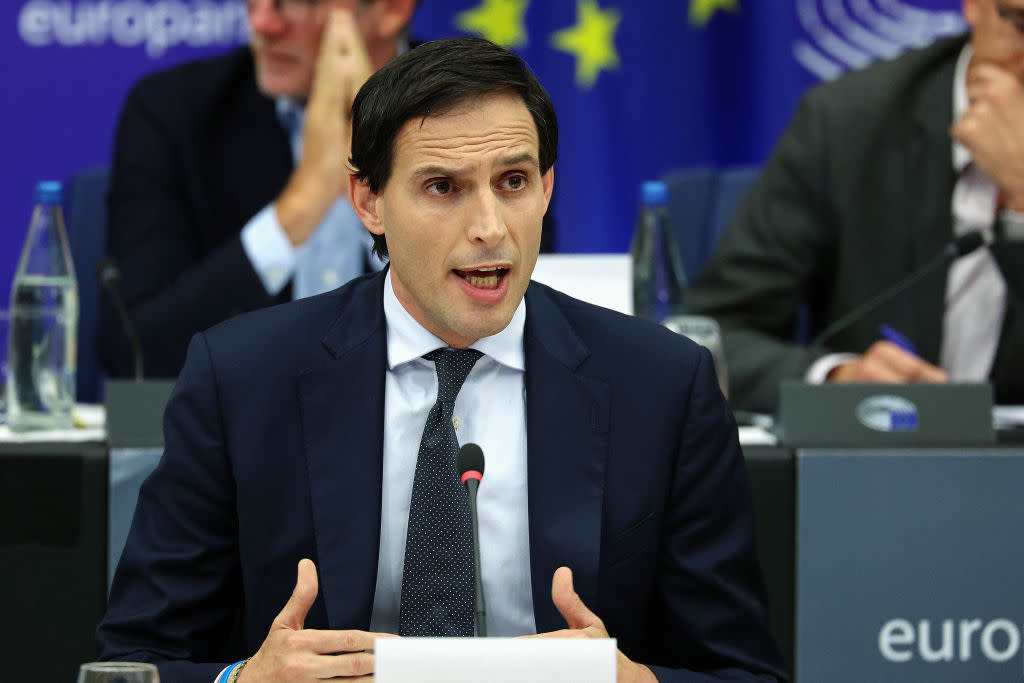EU Climate Chief Says the EU Can Work Better With Companies

Wopke Hoekstra takes part in a hearing of the Committee on the Environment, Public Health and Food Safety in October before becoming EU Commissioner for Climate Action. Credit - Frederick Florin / AFP via Getty Images
Decades of climate policy in the European Union have made the bloc a leader in global decarbonization efforts. Championed by officials at the European Commission in Brussels, a suite of regulations have tackled everything from industrial emissions to corporate disclosure of climate risk. Over that time, though, many European companies have increasingly complained that the cost of the regulations would make their products uncompetitive on the global market.
On April 19, Wopke Hoekstra, the bloc’s top climate official, told me that to keep up climate momentum the EU needs to ensure that climate policy does not harm the competitiveness of European companies. “If we require our companies to go through this green transition at speed, I do think it is also a fair ask from them, of the union and member states, to help them,” he said during an interview in Washington. “Everyone loses if they either go bust or leave our continent—and certainly the climate won’t win from that either.”
Hoekstra, a former Dutch finance minister and McKinsey consultant, took over the EU’s top climate role last fall in the midst of a wide range of complaints about the bloc’s climate policies. Farmers had taken to the streets of European capitals in protest of environmental rules, and a contentious debate about electric vehicle regulations continued to occupy the attention of automakers. Always lingering in the conversation has been the high cost of energy in Europe, driven in part by the price that the bloc imposes on carbon pollution.
To change the tone, Hoekstra and his colleagues overseeing other departments at the European Commission, the EU’s executive body, embarked on a listening tour of industries to understand the pushback and how policymakers might help assuage those concerns. Hoekstra says he hopes that the feedback can lead to concrete changes, including a more cooperative approach between companies and government. “Let's not be naive: one conversation—even one well-structured, very thorough conversation—is not going to do the trick,” he says. “We need real change in the real world.”
What might real change look like? Hoekstra cites the buildout of electric vehicles as one place where the commission can ease concerns. Government, he says, can do a better job partnering with industry to build necessary infrastructure, thereby easing consumer adoption and addressing one industry complaint.
Ensuring European businesses remain competitive with Chinese firms is another top concern. Chinese subsidies have helped the country become a clean technology manufacturing force, making it hard for European companies to compete. In response, the EU has recently moved toward imposing new tariffs on Chinese EVs. In our conversation, Hoekstra insisted that “a level playing field does need to be put in place” to ensure the durability of climate policy. (Even still, many executives have expressed concern about potential tariffs given how intertwined their supply chains are with China).
These debates are not new. For as long as climate change has attracted attention from governments around the world, policymakers have debated whether to cut emissions using carrots (think of government incentives like tax breaks for clean energy) or sticks (think of taxes on carbon emissions). The EU took a largely stick-based approach, including and especially with its Emissions Trading System, which imposes a cost for pollution. That approach has upset many in industry, who say that sticks weigh on competitiveness. The U.S., by contrast, has offered tax cuts for clean technologies and funding for catalytic projects, an approach companies prefer.
Hoekstra’s concern is telling. Five years ago, climate change was a top concern in the bloc without equivocation. Today, as the EU nears critical parliamentary elections, pressures about the cost to industry and citizens have risen on the political agenda. Still, Hoekstra insists the European commitment to addressing climate change isn’t going anywhere—even if implementing policy may require a few tweaks. “There is a clear conviction that we will continue to lead on this,” he says. But the bloc needs “to bridge that better, marry that better with competitiveness for our companies and a just transition for our people.”
Write to Justin Worland at justin.worland@time.com.

